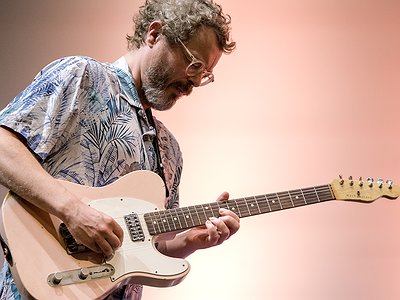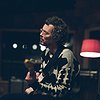Take us through a day in your life, from a possible morning routine through to your work, please.
That's been changing a lot over the last five years. Now I have two kids, two and five years old.
I get up at 6:30. And just hang out with the kids, eat breakfast, get them dressed, etc. And then me and my wife walk them to kindergarten, daycare around nine o'clock.
I have until 3pm and I'm basically dividing my day into different chores. So I have emailing to do, I have a lot of logistical stuff to do because of my touring and my recording practice. I have to answer emails, I have to listen to some music, I'm taking a walk one or two hours per day where I'm just listening to music. If I'm in the process of making new music, that's what I'm going to be listening to. If I'm not in the process of listening ofrcreating new music, I might listen to somebody else's music or I might be listening to Japanese podcasts. And usually I spend like 45 minutes to one hour for a Japanese lesson with with my one of my teachers in Tokyo. And then, if I'm close to a recording session, I will of course be spending most of my time composing.
At three o'clock, I pick up the kids, hang out, play with them, cook and they go to sleep at eight o'clock. And at around eight o'clock. I'm tired.
Back in the day, I had a different routine. I would make all these schedules for myself. Waking up at five in the morning. From five to 5:45 I'd listen to Nina Simone, from 5:45 until 6:30 listen to Plugged Nickel by Miles Davis, from 6:30 till 7:30 work on transcribing a Lester Young solo on “These Foolish Things”, from 7:30 until 8 work on melodic minor and different inversions. From eight till nine eat breakfast, shower. And then from nine onwards, I might have a session with somebody. Lunch 11:30, noon to one practice a couple of new songs, from one to four a new jam session with friends.
Basically, I was filling my days up with music from morning till evening every day and I tried to get at least three sessions in per day playing with other musicians.
Obviously my life has changed now, being a dad.
Could you describe your creative process on the basis of a piece, live performance or album that's particularly dear to you, please?
My creative processes is different, depending on the different things that I'm doing.
If I'm doing a concert, my creative processes is mostly about somehow getting ready mentally to play the concert. Let's say I have to play a concert in one week from now. I find it interesting to to sort of think about when does that concert begin? Does it begin when you go on stage? Does it begin the week before, when you start thinking about the music?
I can always measure how busy I am with music by how much time I have to study Japanese. If I have a concert in one week, I'll often feel like my headspace is occupied, I can't find time for my Japanese studies. I've realised that's because the concert that I'm about to play already takes up space in my head. Not concrete space, I'm not talking about which songs to play or anything. Rather, the focus on playing a concert begins very early for me, on a very intuitive level somehow.
If I'm in a situation where I have to compose music, then my creative process is different again. I spend time every day on just finding little things that I like. It's a very enjoyable, creative process, because I don't need to do anything other than finding a few chord progressions / melodies that I enjoy. A day can easily go by without me finding anything. And then, you know, at the very end of the day, there might be two or three things popping out which have made the day okay.
Listening can be both a solitary and a communal activity. Likewise, creating music can be private or collaborative. Can you talk about your preferences in this regard and how these constellations influence creative results?
I do play solo concerts, but I love playing together with people I love. I love going into the musical room, with people listening, creating something in the moment. Together - that's my favourite way of working on music.
But as you say, I also create music in private, where I'm composing at home, and I'm also listening to music at home, on my own. I do go to concerts. Also, when I'm in a creative process, trying to come up with new music, I tend not to listen to anybody else's music. During that time, it just becomes too much for me.
So basically, in a time where I'm trying to invent something, or come up with something I just enjoy being being on my own, with my thoughts about music and with the stuff I'm composing or with the lineups that I'm trying to set up, thinking about the sound that we're going to create. I really enjoy solitude and privacy in that regard.
Once we meet in the studio, it I feels like I'm so well prepared that I can just let go completely of all my expectations, whatever they might have been.
How do your work and your creativity relate to the world and what is the role of music in society?
I think it relates very directly. Music is a way of expression, it helps me to express my feelings and express the experiences that I'm going through every day in my life. In that way, there's a direct link to the world, of course.
I've always thought that music in the world is important. It's a reflection of what's going on. Music is speaking to us on so many levels. Music goes to the heart and goes to the mind and it goes to the body. For me, it's a very important way of communication.
Art can be a way of dealing with the big topics in life: Life, loss, death, love, pain, and many more. In which way and on which occasions has music – both your own or that of others - contributed to your understanding of these questions?
I think I've always been very intuitive in my approach to music. And the reason for that is that music is very dear to me. When I'm listening to music, I really get emotional. And I love the talkative way that music speaks to you. Sometimes in a concrete way, sometimes it's in a non concrete way, the big topics in life are always there, along with everyday life.
I guess an example for me would be when I did the album Sidetracked, which was back in 2005.
My father had become very sick. And I did not feel like going up on stage and playing music. So I went to a basement instead and tried to compose music for a long time. And the album that came out of that was very different from anything I'd done up until that point. And I didn't really think about this while doing it.
But in retrospect, I can see that at that time in my life, I did not want to perform, but I still had the desire / need to express myself through sound. So I do that much better than by words. Words really are sometimes unnecessary, as Depeche Mode said, they can only do harm.
How do you see the connection between music and science and what can these two fields reveal about each other?
Oh, that's a difficult question. But I'd say the human need for expressing ourselves through sound is important for science. And that goes the other way around as well. We are all connected on many levels - on a spiritual level, but also on a more scientific level.
There are many things going on down here where we are living. But there's also a lot of stuff going on that we don't know about. Music reflects this in the most deep and beautiful way.
Creativity can reach many different corners of our lives. Do you feel as though writing or performing a piece of music is inherently different from something like making a great cup of coffee? What do you express through music that you couldn't or wouldn't in more 'mundane' tasks?
I do spend time every morning making really nice coffee. But for me, it's a different thing. Somehow I'm not expressing myself in any way when I'm making a good cup of coffee.
What happens in music, and what I'm looking for in music, is the unknown. I'm looking for that place in the music where you can feel something, something that gives you goosebumps. Something is happening with you, as a human being while you're listening to it, but you don't understand what it is.
To be able to provide that to a listener, you have to really trust the musicians you play with. And you also have to be give a lot of yourself. No, you have to be naked, basically, and trust that it's okay to let the music guide you.
It's a very emotional thing for me to play music. And it's not an emotional thing for me to make a great cup of coffee. I'm sure it is for a great barista. Some of the great chefs, are probably looking for the same thing as I'm looking for in my music.
Music is vibration in the air, captured by our ear drums. From your perspective as a creator and listener, do you have an explanation how it able to transmit such diverse and potentially deep messages?
I'm not sure but I believe that it has got something to do with the fact that music speaks to so many different parts of our body at the same time.
My father had dementia, and when he was very sick at the end, he could still sing a song even though he couldn't speak. So why is that?
You know, music speaks to layers in different parts of the brain and in different parts of the memory. It activates your body on so many levels. And this is, I think, why it transmits such deep messages.



